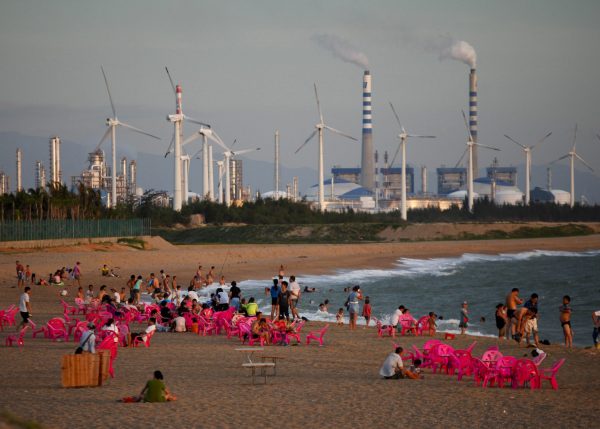In 2018, tightening global financial conditions made for nervous policymakers in emerging economies. Argentina was the first victim, forced to seek a bailout from the IMF as an appreciating US dollar and worsening terms for borrowing triggered a full-blown currency crisis. Turkey looked set to be next, while Indonesia and other Asian economies rushed to get their houses in order.
How quickly times have changed. The tight financial conditions that plagued economies in 2018 have become a thing of the past. The US Federal Reserve has put interest rate rises on hold. Markets are all but certain the Fed will cut interest rates at the end of July and are pricing in four or more rate cuts by the end of 2020.
An increasingly flat yield curve suggests even more easy money may be on the way. The flattening yield curve — where short-term and long-term interest rates converge — is a reliable predictor of US recessions and presages a recession for 2020. The US Federal Reserve normally cuts interest rates by 5 percentage points during a downturn. It has less than half that space today. Faced with a recession, the Fed may resort to ultra-loose unconventional monetary policy sooner rather than later, meaning a further loosening of financial conditions for Asia and more money to finance much needed investment in the region.
The United States is not alone. Falling inflation expectations in Europe are putting more pressure on the European Central Bank to launch a fresh round of monetary stimulus. Weak exports and business confidence in Japan have prompted calls for a further loosening of macroeconomic policies there. The Bank of Korea has cut interest rates for the first time since 2016 and Australia, like others in Asia, has begun cutting interest rates to all-time lows.
The big financial stability challenge that has historically plagued Asia — inflation — is nowhere to be seen. A lack of inflation has given Asian governments much more room to manoeuvre in how they use fiscal and monetary policy to support growth. The trade and technology war between the US and China is similarly benefiting some economies in Asia such as Vietnam, at least in the short term, by redirecting investment and finance their way.
With all this easy finance, many Asian economies are breathing a sigh of relief. The tighter financial conditions of 2018 that sent countries scrambling to fix their houses or, worse, sent them to the IMF, is fading from memory. The pressures for governments to undertake difficult reforms, push for stronger regional integration and implement shrewd macroeconomic policies are similarly fading as a sense of complacency takes its place.
This is a mistake.
Celebrating the short-term benefits of the trade war is a bit like celebrating the weight loss that comes from a deadly disease. The benefits are temporary but the damage is permanent. Estimates that the trade war will cost less than 1 per cent of GDP are grossly optimistic, failing to account for the permanent increases in risk premia that freeze investment and destroy confidence. The more likely effect of full blown trade war on the global economy will be upwards of 5 per cent of GDP. Moreover, any US–China deal will only mean a world of managed trade, redirecting trade away from many economies in Asia and replacing it with confidence-sapping uncertainty as the rules-based order, relied upon for cross-border commerce, is dangerously diminished.
Loose financial conditions can, themselves, be a trap for short-sighted policymakers. If this money is not spent wisely, countries will be left with high inflation, asset price bubbles and appreciated exchange rates with nothing but higher debt levels to show for it. Asian economies have a history of allowing vulnerabilities to develop when global financial conditions loosen. Policymakers need to be vigilant in not allowing the currency, maturity and liquidity mismatches reminiscent of the 1990s to form within their financial systems. The balance sheets of banks, governments, households and corporates are already looking weak to differing degrees in different Asian economies. Preventing a further deterioration of balance sheets will be critical to keeping financial vulnerabilities in check.
Instead, Asian economies should fix the roof while the sun is shining. They need to use the current period of easy money to undertake difficult structural reforms, to repair balance sheets and strengthen their frameworks to lock in low interest rates for productivity-enhancing infrastructure investment.
Are they up to the task?
In our lead essay this week, David Dapice explores these issues in the context of Vietnam. In his essay ‘Is Vietnam swimming naked?’, he shows how Vietnam’s economy is momentarily benefiting substantially from a redirection of FDI from China due to a combination of rising wages in China, a shrinking domestic labour force in China and the US–China trade war. Around US$1.5 billion is entering Vietnam every month. Vietnam is at or near full employment, poverty is declining and growth sits at a very respectable 7 per cent.
Will Vietnam use this opportunity to undertake much needed reform?
Dapice warns that cross-currents are making deep reforms more difficult in Vietnam, despite its reform-oriented prime minister. One factor at play is the uncertain future of the strict anti-corruption campaign, given the health problems facing Communist Party Secretary and President Nguyen Phu Trong. A second factor is the current political economy of taxes and transfers within Vietnam and a third factor is the unease with which the Vietnam Communist Party views the domestic private sector, especially small and medium domestic firms.
In the parlance of Mr Buffet, Dapice notes that the tide is currently high in Vietnam, but the many problems in the Vietnamese economy and financial system cannot be ignored. Vietnam may well set an example for the region. Whether it will be an example of what to do, or what not to do, is very difficult to be confident about.
The EAF Editorial Board is located in the Crawford School of Public Policy, College of Asia and the Pacific, The Australian National University.

